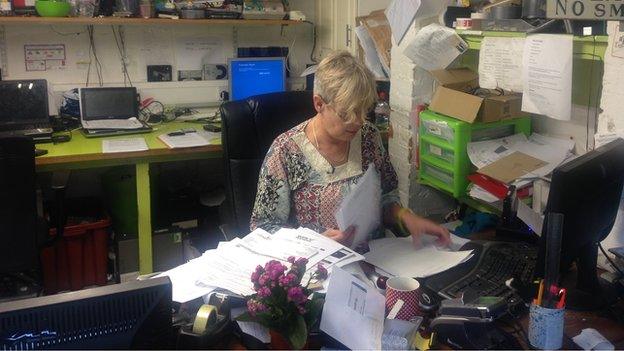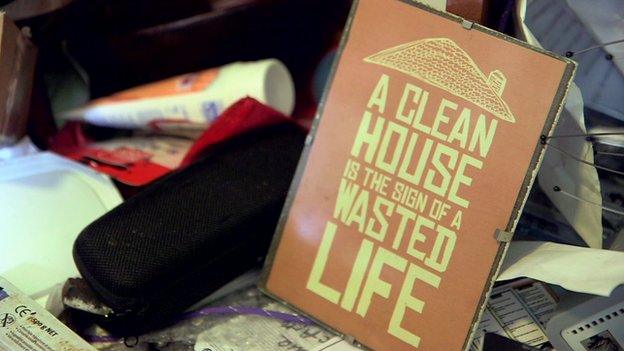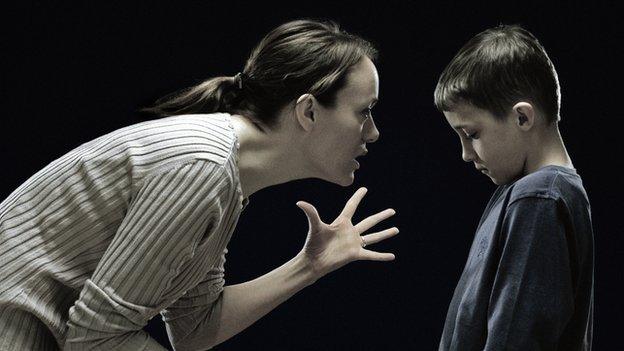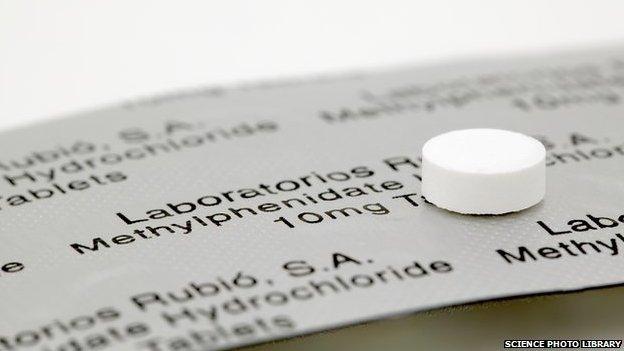Better diagnosis call for adults with ADHD
- Published
Helen Rice says her brain is "like a bucket" because of her ADHD
Attention deficit hyperactivity disorder (ADHD) in adults is a "hidden" problem that needs better diagnosis, the charity for people with the condition, Addiss, has said. How does it affect adults' lives?
"I wake up every morning a new woman. I think, 'Today is the day I'm going to do everything right and get on top of the important things instead of [procrastinating].'
"And every night I go to bed a broken woman because it's all gone wrong again and I haven't done any of it. I can get really upset... horrendously depressed."
Helen Rice, from Caversham, Berkshire, was diagnosed with ADHD two years ago, aged 50.
She has what she describes as the "classic traits" associated with the condition - disorganisation, procrastination and an impulsive nature. "My head is like a bucket," she explains to the Victoria Derbyshire programme.
This can make running her computer repair business difficult.
"I've run it for the past nine years. It is wildly successful in some ways but constantly teeters on the brink of financial ruin because I am useless at admin.
"I want to make people happy so don't want to charge them," she adds. "Though my social skills work well in this business. Customer service is everything and I want to give people what they want."

Helen Rice's ADHD causes her difficulty in organising her work
For Ms Rice, it is a condition that affects her everyday life, but the charity Addiss - the National Attention Deficit Disorder Information and Support Service - believes adult mental health services in the UK "don't consider it as seriously as they should".
ADHD was only recognised as a condition affecting adults in 2008, and the charity's chief executive Andrea Bilbow believes adult psychiatry "has been very slow to understand that children with ADHD carry it into adulthood".
"They used to think you grew out of it," she explains.
'Ferrari for a brain'
When Jonathan Lanham-Cook, 50, from Bristol, was diagnosed with ADHD two years ago, it came as a huge relief. He had been researching whether his son had the condition.
"The first time I took medication it was like someone had turned the fan off in my head. I could focus, get on with writing an email without trying to juggle lots of things at once."
There are currently four types of medication licensed for treatment of the condition, although none offers a permanent cure.
"I'd had problems for years - broken marriages, chaotic behaviour. I really struggled at school and got myself expelled," Mr Lanham-Cook explains.

"It's like having a Ferrari engine for a brain and the brakes of a bicycle," he adds, quoting the psychiatrist Dr Edward Hallowell. "I had a lot of ability but problems reining it in."
Mr Lanham-Cook works as a mental health nurse consultant at a GP practice and believes the diagnosis rates remain "woefully low".
"For example, if a practice has 10,000 adults, around 3% of them are likely to have ADHD - but as it stands only 20-30 would be diagnosed in all probability," he explains.
There are no official figures for the number of people diagnosed with ADHD in adulthood, but the NHS estimates that it affects around 2%-5% of school-aged children and young people, and is the most common behavioural disorder in the UK.

ADHD

Most cases are diagnosed in children between the ages of six and 12
Research shows that both parents and siblings of a child with ADHD are four to five times more likely to have ADHD themselves
Symptoms of ADHD usually improve with age, but many adults diagnosed with the condition at a young age will continue to experience problems
The impact on adults can include underachieving at work or in education, difficulty in relationships with partners and dangerous driving
Source: NHS

Ms Bilbow believes, in adults, it if often mistaken by professionals for depression or bipolar disorder.
She is calling for an increase in capacity to deal with adults referred for assessment and to provide a proper care pathway for teenagers transitioning to adult services.
"A significant number of adults are waiting anything up to two years for an appointment. This means young adults waiting to go to university are having to put their studies on hold, the same applies to job-seekers," she says.
Mr Lanham-Cook believes the situation can be improved through a research project he is hoping to conduct with King's College London, looking at the viability of assessing, diagnosing and treating ADHD in primary care.
Currently, diagnosis and treatment are managed by a specialist, such as a paediatrician or psychiatrist.

The stimulant Ritalin is often prescribed to people with ADHD
"Diagnosis is the key. It's a relief, as your behaviour makes sense," he explains.
"As a person who knows he has ADHD I am able to capitalise on my spontaneity, my energy, my curiosity and my sensitivity - all qualities that plagued me and now I thrive on.
"There is research to suggest a better diagnosis would also have a positive effect on offending rates, as lots of people in prison have the condition who could receive treatment if diagnosed," he adds.
Having his condition medically recognised has also made a great difference to his personal life.
"I have since remarried my first wife. Diagnosis means she understands me and knows to give me reminders.
"She also understands why I might not get round to painting the bathroom wall," he jokes.
Watch Victoria Derbyshire on weekdays from 09:15-11:00 BST on BBC Two and the BBC News Channel. Watch the film in full here.
Follow @BBCOuch, external on Twitter and Facebook, external, and on our YouTube channel, external, or email ouch@bbc.co.uk
- Published23 May 2011
- Published30 January 2014
